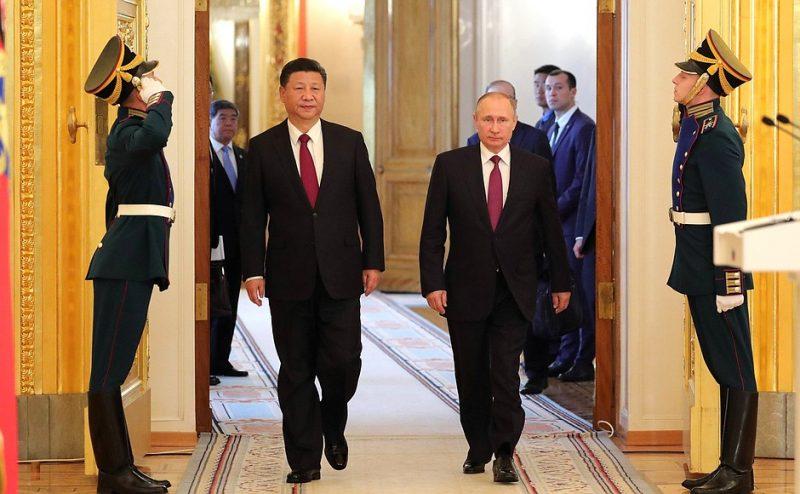A new Sino-Russian high-tech partnership emerges as US tensions mount
Posted By Samuel Bendett and Elsa Kania on October 29, 2019 @ 06:00

China and Russia have not only expanded their military cooperation but are also undertaking more extensive technological cooperation, including in 5G, artificial intelligence, robotics, biotechnology, new media and the digital economy.
In our new report [1], A new Sino-Russian high-tech partnership: authoritarian innovation in an era of great-power rivalry, published today by ASPI’s International Cyber Policy Centre, we map out the unique ecosystem underpinning expanding technology cooperation between Moscow and Beijing.
Sino-Russian relations have been adapting to an era of great-power rivalry. This complex relationship, categorised as a ‘comprehensive strategic partnership of coordination for a new era [2]’, has continued to evolve as global strategic competition has intensified. When Russia and China commemorated the 70th anniversary of the establishment of diplomatic relations between the Soviet Union and the People’s Republic of China in October 2019, the celebrations highlighted [3] the history of this ‘friendship’ and a positive agenda for contemporary partnership that is pursuing bilateral security, ‘the spirit of innovation’, and ‘cooperation in all areas’.
This rapidly emerging ecosystem shows that Beijing and Moscow recognise the value of joining forces in the development of dual-use technologies—which possess clear military and commercial significance. This cooperation is growing across five key areas: dialogues and exchanges; the development of industrial science and technology parks; the expansion of academic cooperation; joint investment funds; and the promotion of joint competitions.
The distinct deepening of this relationship is also a response to increased pressures imposed by the US. Over the past couple of years, US policy has sought to limit Chinese and Russian engagements with the global technological ecosystem, including through sanctions and export controls. Under these geopolitical circumstances, the determination of Chinese and Russian leaders to develop indigenous replacements for foreign, particularly American, technologies, from chips to operating systems, has provided further motivation for cooperation.
These advances in authoritarian innovation should provoke concerns for democracies for reasons of security, human rights and overall competitiveness. Notably, the Chinese and Russian governments are also cooperating on techniques for improved censorship and surveillance and increasingly coordinating on approaches to governance that justify and promote their preferred approach of cyber sovereignty and internet management to other countries and through international standards and other institutions. Today’s trends in technological collaboration and competition also possess strategic and ideological implications for great-power rivalry.
It will be important to track the trajectory and assess the implications of these Sino-Russian technological collaborations, given the risks and threats that could result from those advances. In a world of globalised innovation, the diffusion of even the most sensitive and strategic technologies, particularly those that are dual-use in nature and driven by commercial developments, will remain inherently challenging to constrain but essential to understand and anticipate.
To avoid strategic surprise, it’s important to assess and anticipate these technological advancements by potential adversaries. Like-minded democracies that are concerned about the capabilities of these authoritarian regimes should monitor and evaluate the potential implications of these continuing developments.
The US and Australia, along with allies and partners, should monitor and mitigate tech transfer and collaborative research activities that can involve intellectual property theft and extra-legal activities, including through expanding information-sharing mechanisms. This collaboration should include coordinating on export controls, screening of investments, and restrictions against collaboration with military-linked or otherwise problematic institutions in China and Russia.
It’s critical to continue to deepen cooperation and coordination on policy responses to the challenges and opportunities that emerging technologies present. For instance, improvements in sharing data among allies and partners within and beyond the Five Eyes nations could be conducive to advancing the future development of AI in a manner that’s consistent with our ethics and values.
Today, like-minded democracies must recognise the threats from advances in and the diffusion of technologies that can be used to empower autocratic regimes. For that reason, it will be vital to mount a more unified response to promulgate norms for the use of next-generation technologies, particularly AI and biotech.
Article printed from The Strategist: https://aspistrategist.ru
URL to article: /a-new-sino-russian-high-tech-partnership-emerges-as-us-tensions-mount/
URLs in this post:
[1] new report: https://www.aspistrategist.ru/report/new-sino-russian-high-tech-partnership
[2] comprehensive strategic partnership of coordination for a new era: http://www.xinhuanet.com/english/2019-06/06/c_138119879.htm
[3] highlighted: http://kremlin.ru/events/president/news/60674#sel=35:7:Wa,35:8:aW
Click here to print.